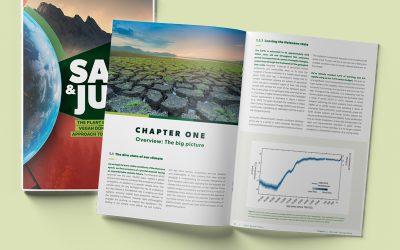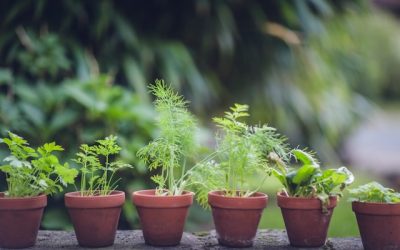Blog
Latest IPCC report leaves no room for doubt: we need a Plant Based Treaty now
March 17, 2022
A new report released in early March by the UN’s The Intergovernmental Panel on Climate Change (IPCC) leaves no doubt about the causes, impacts and solutions to the ongoing climate crisis.
The report, Climate Change 2022: Impacts, Adaptation and Vulnerability, is compiled by 270 authors from 67 countries and brings together research from over 34,000 scientific papers to bring us one simple message: we must act now to protect our most vulnerable from catastrophic climate change, and we must tackle animal agriculture if we are to stand a chance at solving the ongoing crisis. Importantly, voices of people of colour and those living in poorer communities – who will be disproportionately affected by severe climate change – are now becoming increasingly heard within the report, with a much-needed focus on climate justice and Indigenous knowledge running throughout.
The latest IPCC report also aligns with many of the demands set out in the Plant Based Treaty, highlighting the urgent need for dietary change, importance of nature restoration and tree planting as well as highlighting the requirement for a large-scale shift in subsidies away from animal agriculture.
Here are six key take-aways from the report:
1. Diet change is urgently needed.
Similar to the second demand of the Plant Based Treaty – Redirect – the IPCC has highlighted the urgent need for a shift to more plant-based food, particularly in areas where there is an excess consumption of animal-based calories. Such a shift would enable humanity to both mitigate climate change (reducing its overall impact) as well as adapt to climate change, creating additional resilience and ability to cope with the increasing changes to come. Switching to more plant-based diets also has the potential to reduce mortality rates by reducing diet-related disease, increase biodiversity, reduce ecosystem degradation and free up land for purposes such as nature restoration.
“Dietary change in regions with excess consumption of calories and animal-sourced foods to a higher share of plant-based foods with greater dietary diversity and reduced consumption of animal-sourced foods and unhealthy foods (as defined by scientific panels such as EAT Lancet), has both mitigation and adaptation benefits along with reduced mortality from diet related non-communicable diseases, health, biodiversity and other environmental co-benefits (high confidence).” – IPCC, 2022
2. We need to divert subsidies away from animal agriculture, and urgently.
The IPCC clearly state the urgent need for a radical overhaul of subsidies that are currently funding climate chaos, a sentiment echoed in the second demand of the Treaty – Redirect. The IPCC highlight that a change to subsidy systems would trickle into food prices and this dietary choice, making plant based choices more affordable. Such a suggestion is evidently much needed in order to turn the tables on our current, unsustainable and resource-hungry food system.
“Subsidies directed at staple foods and animal sourced foods could be shifted towards diversified production of plant-based foods in order to change the relative price of foods and thus dietary choice” – IPCC, 2022
This advice follows the shocking announcement last month that the US government under the Biden Administration plan to subsidize the meat and dairy industry to the tune of $1billion; hopefully this recent revelation from the IPCC will slam the brakes on such a colossal climate catastrophe.
3. We need to redirect current marketing strategies away from animal products and towards plant based alternatives.
While dietary choices remain a complex issue with many factors shaping them, the IPCC have pointed out that the marketing tactics currently used to promote animal products should be utilized to encourage the consumption of plant-based foods as a key means to promote shifts to climate-friendly diets. Such a move is echoed within the Redirect demand of the Plant Based Treaty, where it is proposed that various key resources are redirected to promote plant-based foods.
“Regulation of marketing could change desirability of climate-unfriendly and unhealthy foods… Many of the same strategies used to increase sales by conventional food marketing efforts hold potential to change the desirability and people’s preferences for plant foods which are strongly shaped by social-cultural norms.” – IPCC, 2022
4. The IPCC recommends that 30-50% of the world should be conserved.
Aside from changes to what we eat and how we farm, investing in nature and social justice are key steps, the IPCC calls for 30-50% of the world to be conserved. In short, the IPCC are stating that if we wish to survive on this planet, we must make sure there is space for nature, too. This aligns with many of the Plant Based Treaty’s demands, particularly the first demand (Relinquish) and the third of the three R’s – Restore.
We urgently need to protect nature, its ecosystems and all of the amazing things they do for us – however, we cannot do that without halting the ongoing destruction and driving forces behind the degradation of nature, and we must work to restore these key ecosystems and their essential functions.
“Safeguarding biodiversity and ecosystems is fundamental to climate resilient development, in light of the threats climate change poses to them and their roles in adaptation and mitigation. Recent analyses, drawing on a range of lines of evidence, suggest that maintaining the resilience of biodiversity and ecosystem functions at a global scale depends on effective and equitable conservation of approximately 30 per cent to 50 per cent of Earth’s land, freshwater and ocean areas, including currently near-natural ecosystems.”
5. Climate Justice is Social Justice
By placing climate justice and protection of the world’s most vulnerable communities – who will be predominantly and disproportionately most affected by the climate crisis – at the heart of the messaging and solutions, the IPCC are finally taking steps to help bridge the gap and work towards fair, just solutions for those most affected by climate change. The report also demonstrates the urgent need to tackle the ongoing expansion of animal agriculture in developing nations, especially in the world’s poorest communities, some of whom are targeted through ‘charity’ animal gifting schemes, which greatly exacerbate problems and block communities developing long-term, climate-resilient plans.
“Climate resilient development is facilitated by … developing partnerships with traditionally marginalised groups, including women, youth, Indigenous Peoples, local communities and ethnic minorities. These partnerships are most effective when supported by enabling political leadership, institutions, resources, including finance, as well as climate services, information and decision support tools.” – IPCC, 2022
6. We are running out of time to act, but there’s still hope.
The latest IPCC report holds a lot of hope alongside stark and important warnings. We know what is happening, the causes and how we can solve the crisis we face, but we must start taking steps now. The IPCC stresses that “any further delay in concerted global action will miss a brief and rapidly closing window to secure a liveable future.”.
And while we have already caused some degree of irreversible damage, there is so much to be gained by making much-needed changes now, particularly steps as simple as changing what we put on our plates alongside campaigning for systemic and political change.
Read the full IPCC report here.
Actions you can take
- Try vegan – it’s easy, delicious, healthy and good for the planet
- Sign the Plant Based Treaty & share it with your friends
- Ask your city to endorse the Plant Based Treaty
- Sign the petition against the Biden Administration sending $1bn of subsidies to animal agriculture
- Find out more about animal gifting schemes
- Share this article

Natasha Maria is a part of the Plant Based Treaty and Climate Save Movement teams. She has an MSc in Sustainable Food & Natural Resources, with a strong interest in climate change, environmental issues, restoration ecology, landscape regeneration, food justice and agroecology.
More from the blog
6 Important Calls To Action From The Safe And Just Report – Part One
By Miriam Porter
Grow Your Own Kale And Spinach For Healthy Green Smoothies
By Miriam Porter
The Importance Of Exercise And Tips On Building Muscle
By Miriam Porter



